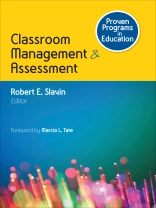Evidence-based best practices that improve classroom environments and assessment techniques!
If your goal is a smoother-running, participatory classroom and improved student achievement, you’ll find essential best practices in this new resource, edited by a renowned education scholar, Robert Slavin .
Dr. Robert Slavin, Professor and Chairman of the Success for All Foundation, has gathered insights and findings from 26 leading education researchers, presented in succinct chapters focused on key aspects of teaching and classroom management practice. Readers will find:
- Strategies for assessment that address formative approaches, differentiated classrooms, the role of feedback in the assessment process, adaptation for the Common Core, and more
- Proven techniques for classroom management, including immediate, positive steps that teachers can take
- User-friendly content supported by quick-read charts and graphs
Drawing from the leading international experts in the field of teaching and originally published in the journal Better: Evidence-Based Education, this is a valuable new resource for education leaders at all levels.
Innehållsförteckning
Foreword – Marcia L. Tate
Introduction
Preface – Robert Slavin
About the Editor
Chapter 1. Assessment in a Differentiated Classroom – Carol Ann Tomlinson and Tonya Moon
Chapter 2. Formative Assessments in High Schools – Douglas Fisher and Nancy Frey
Chapter 3. Formative Assessment and Feedback to Learners – Steve Higgins
Chapter 4. Multiple Measures in Classroom Assessment – Susan Brookhart
Chapter 5. Promoting Learning and Achievement Through Self-Assessment – Heidi Andrade
Chapter 6. Exposing the Imbalance in ’Balanced Assessment’ – W. James Popham
Chapter 7. Do We Need an Assessment Overhaul? – Jay Mc Tighe and Grant Wiggins
Chapter 8. Formative Assessment: An Enabler of Learning – Margaret Heritage
Chapter 9. Upgrading High-Stakes Assessments – Albert Oosterhof
Chapter 10. England Versus Wales: Education Performance and Accountability – Sandra Mc Nally
Chapter 11. In Search of Feasible Fidelity – David Andrews
Chapter 12. Before Choosing, Ask Three Questions – Steve Fleischman
Chapter 13. What Works in Classroom Management – Thomas Kratochwill, Rachel De Roos, and Samantha Blair
Chapter 14. Good Instruction Is Good Classroom Management – Robert Slavin
Chapter 15. Am I the Only One Struggling With Classroom Management? – Inge Poole and Carolyn Evertson
Chapter 16. Classroom Management: What Teachers Should Know – Regina Oliver
Chapter 17. From Tourists to Citizens – H. Jerome Freiberg
Chapter 18. Promoting Engagement With Check & Connect – Angie Pohl and Karen Storm
Chapter 19. Dealing With Classroom Management Problems – Saul Axelrod
Chapter 20. Support for Teachers Around the World – Judy Hutchings
Chapter 21. Positive Behavioral Interventions and Supports – Catherine Bradshaw
Chapter 22. First Step to Success for Preschool Children – Edward Feil, Andy Frey, and Annemieke Golly
Chapter 23. Improving Teaching in Science and Mathematics – Claudia Fischer and Karen Rieck
Chapter 24. Improving Reading and Math Achievement Across a Whole District – Allen Thurston, Peter Tymms, Christine Merrell, and Nora Conlin
Chapter 25. Co-Teaching: Inclusion and Increased Student Achievement – Marilyn Friend and Tammy Barron
Chapter 26. Implementing Response to Instruction and Intervention With Older Students – Nancy Frey and Douglas Fisher
Chapter 27. Teaching English Language Learners in Inclusion Settings – Kristi Santi and David Francis
Index
Om författaren
Robert E. Slavin is director of the Center for Research and Reform in Education at Johns Hopkins University, director of the Institute for Effective Education at the University of York, and the cofounder and chairman of the Success for All Foundation. He has authored or coauthored more than 200 articles and 20 books, including Educational Psychology: Theory into Practice (Allyn & Bacon, 1986, 1988, 1991, 1994, 1997, 2000, 2003), Cooperative Learning: Theory, Research, and Practice (Allyn & Bacon, 1990, 1995), Show Me the Evidence: Proven and Promising Programs for America’s Schools (Corwin, 1998), Effective Programs for Latino Students (Erlbaum, 2000), and One Million Children: Success for All (Corwin, 2001). He received the American Educational Research Association’s Raymond B. Cattell Early Career Award for Programmatic Research in 1986, the Palmer O. Johnson award for the best article in an AERA journal in 1988, the Charles A. Dana award in 1994, the James Bryant Conant Award from the Education Commission of the States in 1998, the Outstanding Leadership in Education Award from the Horace Mann League in 1999, and the Distinguished Services Award from the Council of Chief State School Officers in 2000. He received his BA in psychology from Reed College in 1972 and his Ph D in social relations in 1975 from Johns Hopkins University.












